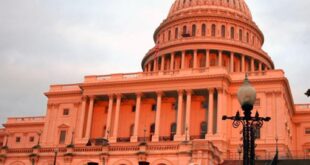 BEIRUT – Three years after Rafik al-Hariri’s assassination, the crisis unleashed by his death opens ever deeper rifts in Lebanon and threatens the state and society the leader tried to rebuild after the civil war.
BEIRUT – Three years after Rafik al-Hariri’s assassination, the crisis unleashed by his death opens ever deeper rifts in Lebanon and threatens the state and society the leader tried to rebuild after the civil war.
The February 14 anniversary of Hariri’s death has become a symbol for divisions between the heirs to his legacy and their opponents, who are waging a political conflict that has paralyzed government and aggravated communal animosities.
The anti-Syrian governing coalition, led by Hariri’s son and political heir, Saad, has been fending off a challenge by opposition factions backed by Damascus for 15 months. Their confrontation has already led to lethal street violence.
As mediators struggle to broker an end to the crisis, a recent escalation in the rivals’ war of words and regular skirmishes between their supporters have raised fears of more bloodshed, even if many see little scope for full civil war.
“Things are coming to a head. I fear if there’s no end to the political deadlock soon, the situation might explode,” a senior opposition source told Reuters.
This year, as last, the anniversary of Hariri’s death has shown the depth of the divide between the governing coalition and the opposition, which is led by the powerful Shi’ite Muslim group Hezbollah.
In new violence close to the anniversary, senior Hezbollah commander Imad Moughniyah was killed in Damascus on Tuesday by a bomb planted in his car. Hezbollah and its backer Iran blamed Israel, which denied any involvement.
Hariri and his allies have stepped up their verbal campaign against Hezbollah and its opposition allies, accusing them of trying to restore Syrian control of Lebanon. Damascus was forced to end a 29-year military presence in Lebanon by international pressure in the wake of Rafik al-Hariri’s killing.
Syria has always denied killing Hariri or any of the several other anti-Syrian figures blown up or shot dead since his death in a truck bombing that also killed 22 other people.
Saad al-Hariri, adopting a bolder approach to a crisis that has left Lebanon without a president since November, last week openly alluded to the prospect of conflict.
BOLDER APPROACH
“If our fate is confrontation, we are for it,” said Hariri, who inherited his father’s position as the main Sunni Muslim politician in Lebanon — a country with a sectarian system that links politics and religion.
Druze leader Walid Jumblatt, a Hariri ally, went further by saying war would be “welcome”, expressing a readiness for a fight which observers believe both sides want to avoid.
“We do not want a war,” Jumblatt later clarified. “I cannot fight them,” he said, referring to Hezbollah — the only faction that kept its weapons after the 1975-90 civil war, using them to battle Israeli forces which occupied the south until 2000.
“But they will not enter my home, I will not permit them. There is a great lie called coexistence,” he added, calling for “divorce” with Hezbollah.
Seeing the rhetoric as propaganda to galvanize support on the Hariri anniversary, Hezbollah has repeated its refrain that the opposition “will not be dragged into internal strife”.
The group’s military dominance still precludes any descent into widespread armed confrontation, many observers say. But even if neither side wants war, tough language could easily lead to more violence in a country awash with guns.
“There are people who take this as orders from the bosses,” said Timur Goksel, a lecturer on security at the American University of Beirut. “Nobody has reached the level of militarization that is required for all-out war.”
Tensions have started to spill into regular street skirmishes. Hariri loyalists clashed with supporters of the opposition Shi’ite Amal movement on Tuesday evening, while Jumblatt loyalists fought rival Druze.
“Freedom and democracy are in danger,” wrote Suleiman Taqieddin in the pro-opposition As-Safir newspaper.
“Everyone here has begun to draw his legitimacy from force of arms,” he added, referring to barrages of gunfire let off by supporters of rival leaders during television appearances.
The pro-government An-Nahar shared the concern. “The country cannot withstand all this rage, all this violence, all these threats, all these voices that resemble the Guns of Navarone … as it stands on the edge of the abyss,” it said in an editorial.
 Eurasia Press & News
Eurasia Press & News



